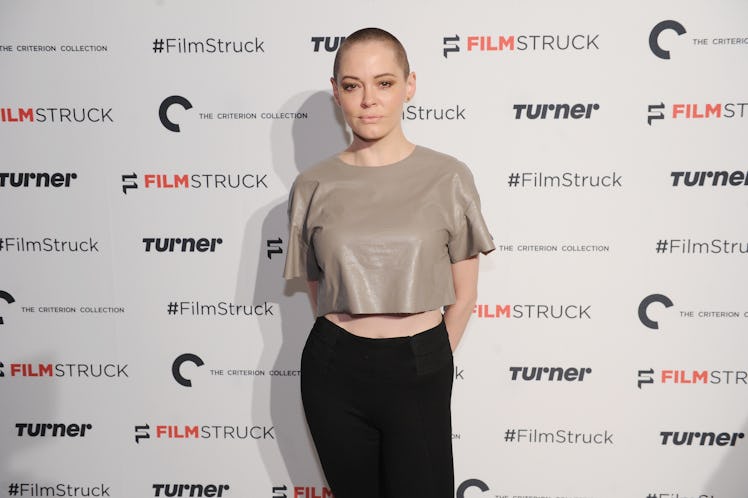
Women Are Boycotting Twitter After It Suspended Rose McGowan & Chrissy Teigen Is All For It
It's been a more intense week than usual for Hollywood. After actress Rose McGowan announced she'd been suspended from Twitter, her supporters were outraged. In response, late at night on Thursday, Oct. 12, some users called for women to boycott Twitter on Friday. The boycott would last 24 hours, beginning at midnight on Friday and ending that night.
McGowan was banned by the social media giant for publicly posting a tweet that contained a phone number, violating Twitter's rules of service, Twitter said. She did so after a report by the New York Times last week that revealed a handful of women, McGowan among them, had accused movie mogul Harvey Weinstein of sexual harassment, misconduct, and assault. TheTimes found that Weinstein had been paying off cases of harassment for decades. In response, Weinstein's spokeswoman said in a statement that "any allegations of non-consensual sex are unequivocally denied" and that "with respect to any women who have made allegations on the record, Mr. Weinstein believes that all of these relationships were consensual." The statement added that he is in counseling for his behavior.
Per Vanity Fair, at least 32 women have so far come forward with their stories. Prompted by these revelations, other celebrities have spoken out on their experiences with other Hollywood executives; Isa Dick Hackett alleged Amazon Studios producer Roy Price harassed her, and hours after her story was published by The Hollywood Reporter, on Thursday, Amazon suspended him. Price declined to comment to THR through a spokesperson, and Amazon said in a statement to THR that "we looked closely at this specific concern and addressed it directly with those involved." Terry Crews and James Van Der Beek both spoke about allegedly being groped by the movie industry's elites.
The idea of the boycott, per the New York Times, originated (at least on social media) with software engineer Kelly Ellis, who posted a tweet with the hashtag #WomenBoycottTwitter at 11 a.m. Thursday after initially raising the idea hours earlier.
McGowan chimed in with her full support for the boycott. She was joined by Chrissy Teigen, Mark Ruffalo, and Alyssa Milano, among others.
But the idea is getting a lot of mixed reactions.
Some users were all for it and loved the idea.
Others were critical of the idea because they argued that a boycott of the platform served to act as another form of silence, when silence is what many women experience when they've dealt with sexual harassment or assault by men.
Some users just felt that the method of protest was inappropriate and fed more into the problem, while the platform could be used in a more productive way.
One of the arguments for boycotting Twitter, per Teigen, is that the platform makes money off users, which include women, so by eliminating their usage for a day, Twitter would be forced to reevaluate its stance.
Even this point of whether Twitter would budge because of a one-day boycott carried about by a handful of people, considering its mammoth base of its users, was the subject of much argument online.
Director Ava DuVernay brought up that women of color hadn't received the same kind of outcry for instances of their silencing; recently, for example, Jemele Hill, who the White House called to be fired by ESPN.
The language of "women" also seemed to be interpreted by some as being a narrow and exclusionary definition of gender and personhood. Ellis apologized for the oversight of both on Twitter.
Things got even more complicated when the account Women for Trump weighed in with essentially the same argument.
Teigen, in response, made it clear that the boycott was not just about McGowan or any of the other women who'd come forward to accuse Weinstein of harassment or worse; she was rejecting the culture, starting with those at the very top. In this, Weinstein is hardly alone.
Teigen also hinted at the possibility that she might extend her boycott indefinitely.
Some people also argued that, by giving up their Twitter usage for a day, they were giving up space in a public forum and voluntarily allowing that space to be dominated by men. Multiple users suggested that the boycott should've been the other way around, with men opting out of the platform for the day and giving women their own space.
Whether or not the boycott has the numbers it needs to make an impact on the social media platform, it's certainly generated a lot of buzz.